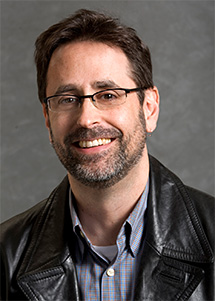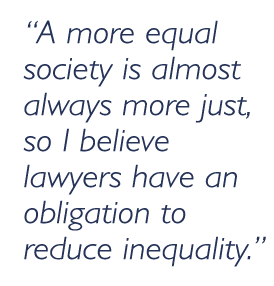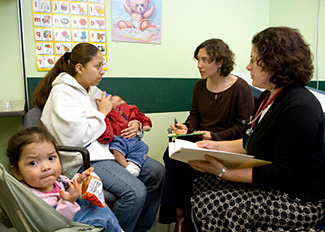
By Susan Gluss
It’s been fifty years since President Lyndon Johnson launched the War on Poverty, which helped create a federal safety net for the poor. Did the program succeed? Proponents say it prevented even more people from slipping into poverty; others say it didn’t do enough.
No matter your point-of-view, the facts are bleak. Millions of Americans live below the poverty line: often hungry, in fear of losing their homes, or homeless.
While the federal government struggles to help the impoverished, anti-poverty lawyers often fill the breach. Now, aspiring law students who want to enter the field have a new resource: Poverty Law, Policy, and Practice, a casebook co-authored by Jeff Selbin. The clinical law professor is also the faculty director of the East Bay Community Law Center (EBCLC), a nationally-recognized poverty law clinic. Selbin agreed to talk about the new casebook and the rationale behind it.
Q: Why did you and your co-authors decide to write a casebook on poverty law? Fifty years after the War on Poverty, is it still relevant today?
A: We were motivated primarily by the growing inequality in the U.S., which is at the highest level since the Gilded Age in the 1920s. Government retreat from commitments made during the War on Poverty and the New Deal has made life harder for tens of millions of Americans, including a lot of working families and an eroding middle class.
In California almost one in four kids lives in poverty. For children of color, the numbers are even worse. We’re talking about the richest state in the richest country in human history. Frankly, it’s unconscionable.
Q: What is the purpose of the book?
A: We hope the casebook will encourage law students to engage actively in ongoing efforts to combat the causes and conditions of poverty. They represent the next generation of lawyers who can devote some or all of their careers to building a more just and equitable society.
Q: How do you define poverty law?
A: I often use the term antipoverty law, since I think it’s a more accurate description of what we’re trying to do. Social welfare policy, of which antipoverty law is only a piece, is a measure of society’s sense of collective obligation—what we owe each other as human beings.
Q: In your preface, you write that the “Supreme Court has largely foreclosed an affirmative antipoverty avenue in the federal courts….” What do you mean?
A: During the heyday of the War on Poverty, antipoverty lawyers believed they could persuade the U.S. Supreme Court to recognize an affirmative right to things like a minimum income, housing, and education. In 1970, the Court said that welfare benefits couldn’t be terminated without a hearing. But only two weeks later, it refused to require states to provide welfare grants in any particular amount.

The Court basically said that it’s the job of the elected branches—not judges—to make social and economic policy. Although the federal courts are still an important venue, lawyers have increasingly turned to legislatures and state courts to advance an antipoverty agenda.
Q: What is the role of the law—and lawyers—in lifting the poor out of poverty? In addressing economic inequality?
A: Getting students to think about that question is a central goal of the book. Lawyers in California, for example, are required by state law “never to reject … the cause of the defenseless or the oppressed.”
As a practical matter, this raises a number of questions: Should we be working in courts, government agencies, or legislatures? Should we advocate for solutions at the local, state, or federal level? Should we rely solely on domestic law, or can we invoke international law? My hope is that students will begin to envision their own role in addressing inequality.
Q: How does such activist lawyering fit into the U.S. legal profession?
A: Lawyers provide zealous representation to clients. People with enough money can hire a lawyer. Low-income people can’t afford lawyers. In the cases in our book, real clients have real interests that their lawyers are pursuing—income to feed their families, a roof over their head, access to education and healthcare for their kids.
Without antipoverty lawyers—whether provided by the government, non-profits, or pro bono from private firms—these clients will suffer genuine harm. Representing the interests of low-income clients should not be objectionable to anyone in the profession who takes seriously our role as advocates.
Q: Is it up to lawyers to eradicate poverty—or Congress and policymakers?
A: I don’t think lawyers are solely responsible for addressing poverty. In fact, an important lesson over the last 50 years is that poverty can’t be litigated away. That said, lawyers have a special responsibility for the administration of justice. We must ensure everyone has access to courts, agencies, and elected officials. A more equal society is almost always more just, so I believe lawyers have an obligation to reduce inequality.
Q: How has the decline in federal funding for legal services hurt lawyers’ efforts to represent low-income clients?
A: This is a huge challenge. Today, the federal government provides about $6 a year for every low-income person eligible for legal aid. Decades of budget cuts have been devastating for many legal services programs, which have closed neighborhood offices, slashed staff, and eliminated practice areas.
Despite these rather dire circumstances, creative lawyers and generous funders have worked very hard to fill the chasm left by declining federal funding and heightened program restrictions. In fact, the legal services sector is bigger and much more diverse than it ever was.
Q How does EBCLC fit into this scenario?
A: EBCLC is a good example of this creativity. Even without federal legal services money, the law center has become the largest provider of free legal services in the East Bay and the largest community-based law school clinic in the country. This decentralization and diversification of antipoverty law programs has yielded a lot of new and innovative strategies at the local level. In the book, we highlight the many and varied roles lawyers play in combatting poverty.

law student.
Q: Is there a moral obligation of the U.S. to care for its people, or is this a nation of “bootstrappers?”
A: We have an obligation to care for one another as human beings. There are also strong social, political and economic reasons to reduce inequality—in short, we ignore poverty at our collective peril.
Republican Governor of Ohio John Kasich recently said that people who think the poor are lazy should ask their grandparents if they worked for the WPA [the New Deal’s Work Projects Administration that hired unemployed people to work on public projects]. His point was that at some point we all benefit from a form of public assistance—jobs programs, the GI Bill, Social Security, etc.—and that very few of us are immune from the impact of a bad economy.
Q: Your book includes two chapters new to poverty law casebooks: on human rights law and on criminalization. What do you mean by the criminalization of poverty?
A: Criminalization of poverty refers to a vicious cycle that traps many people in poverty. On one hand, we subject welfare applicants to criminal-like indignities—such as fingerprinting and home visits—that would never be imposed on recipients of government benefits like student loans or tax breaks. This deters many eligible individuals and families from seeking much-needed aid.
At the same time, mass incarceration and the dire consequences of a criminal record make it almost impossible for many people to escape poverty. So we treat poor people like criminals because they are poor, and we impoverish people with criminal records by erecting barriers to things like employment, housing and education.
Q: What about human rights law? How does it bring social justice to America’s poor?
A: I think it’s fair to say that this is a work in progress. The U.S. has signed or ratified international treaties that establish rights to certain economic and social benefits, such as affordable housing and a decent education. But the enforceability of these rights by courts is hotly contested, so some of the significant force of human rights is more rhetorical than legal at this point.
Q: How else is your casebook different from the rest?
A: This is the first poverty law casebook in 17 years and only the second one since 1976. A lot has changed over the last few decades, so we’ve tried to bring the field up to date. In addition to the core legal doctrine, we incorporate the latest data, literature and policy debates. We end the book with a discussion of non-governmental approaches to poverty reduction.
Q: How did your work at EBCLC influence the writing of the book?
A: At EBCLC, I have witnessed firsthand the power of law and lawyers to change people’s lives—both clients and students—for the better. In equal measure, I have seen law’s limits. We can’t right every wrong, especially when poverty and its impacts are so deeply entrenched.
Our students learn that they can do anything, but they can’t do everything. The joys and heartache are inextricably bound together, and I think the book reflects this reality of practice.